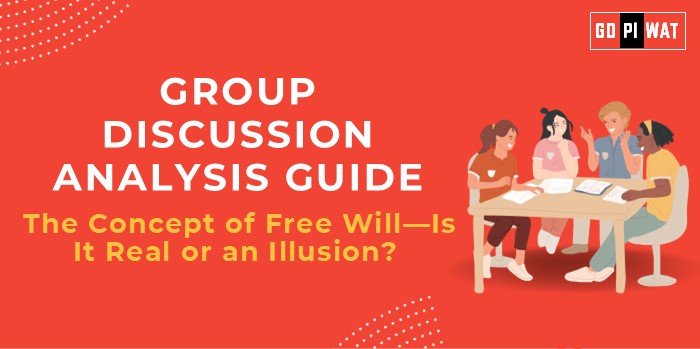📋 Group Discussion (GD) Analysis Guide: The Concept of Free Will—Is It Real or an Illusion?
🌐 Introduction to Free Will
Opening Context: The debate over free will has been central to philosophy, psychology, and neuroscience, questioning whether human actions are determined by personal choice or shaped by external forces. The topic is increasingly relevant as AI and neuroscience bring new dimensions to understanding autonomy.
Topic Background: Free will, a concept rooted in ancient philosophy, has evolved with contributions from thinkers like Descartes, Kant, and contemporary scientists. The advent of determinism, neuroscience, and quantum mechanics has challenged traditional views, making this debate pivotal in ethics and philosophy.
📊 Quick Facts and Key Statistics
- 📜 Ancient Origins: The term “free will” was first philosophically examined by Stoics in Ancient Greece, connecting it to moral responsibility.
- 🧠 Neuroscience Insight: Studies (e.g., Libet’s 1983 experiments) suggest decisions may be initiated in the brain before conscious awareness.
- 📊 Public Opinion: Surveys indicate that 70% of people believe in free will as a vital part of moral accountability.
- 🤖 AI and Ethics: The rise of AI raises questions about “free will” in decision-making algorithms.
👥 Stakeholders and Their Roles
- 📚 Philosophers: Explore and critique the theoretical underpinnings of free will.
- 🔬 Scientists: Study neural correlates and test hypotheses regarding autonomy.
- ⚖️ Ethicists: Analyze moral implications of free will’s existence.
- 👥 Public and Policy Makers: Influence laws and moral judgments based on belief in free will.
🏆 Achievements and Challenges
✨ Achievements:
- 📜 Theoretical Progress: Advancements in understanding compatibilism and determinism.
- 🧪 Technological Insights: Neuroscience experiments challenge or validate free will concepts.
- ⚖️ Legal Implications: Adoption of free will assumptions in criminal justice systems globally.
⚠️ Challenges:
- 📉 Determinism: Scientific evidence challenging the autonomy of human choices.
- ⚖️ Moral Dilemmas: Questions over accountability in a potentially deterministic framework.
- 🌏 Global Comparison: In Western cultures, free will underpins individuality, while Eastern traditions emphasize collective determinism.
📖 Case Study: Libet’s experiments showed a neural activity delay preceding conscious decisions, sparking debates over pre-determined actions.
💬 Structured Arguments for Discussion
- ✔️ Supporting Stance: “Free will is necessary for moral accountability and personal growth.”
- ❌ Opposing Stance: “Scientific evidence suggests decisions are predetermined, making free will an illusion.”
- ⚖️ Balanced Perspective: “While free will may be limited by biological and environmental factors, humans can exercise autonomy within constraints.”
🛠️ Effective Discussion Approaches
- 🎯 Opening Approaches:
- 📖 “Historically, free will has shaped our understanding of ethics and justice.”
- 🧠 “Recent neuroscience discoveries challenge traditional notions of autonomy.”
- ⚖️ “Does belief in free will enhance societal progress?”
- 🔄 Counter-Argument Handling:
- Use examples like AI decision-making models or criminal cases where free will is debated.
🔍 Strategic Analysis of Strengths and Weaknesses
- 💪 Strengths: Inspires moral responsibility; fosters societal trust.
- ⚡ Weaknesses: Challenged by determinism; reliance on cultural narratives.
- 🌟 Opportunities: Enhance legal frameworks; align AI with ethical principles.
- ⚔️ Threats: Overemphasis on determinism may erode accountability.
📚 Connecting with B-School Applications
- 🌍 Real-World Applications: Ethical decision-making, AI governance, leadership strategies.
- ❓ Sample Interview Questions:
- “Can leaders exercise free will in ethical decision-making under pressure?”
- “How does the concept of free will impact organizational accountability?”
- 💡 Insights for Students:
- Explore leadership’s reliance on autonomy.
- Integrate philosophical perspectives in ethical leadership models.


